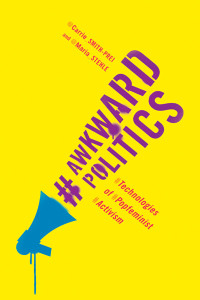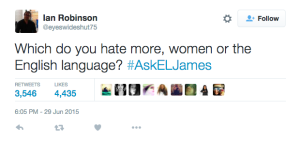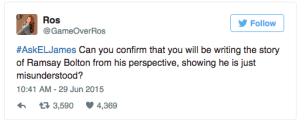European Crises – Europe Crazies: Futures, Racism, and a Different Kind of Silence
Maria Stehle
At a children’s birthday party in a park, I suddenly found myself in a conversation so uncomfortable that I longed for an interruption: for one of our children to call for me, for my husband to need my help, for any of the other guests coming over to say good-bye. This is a rather uncommon feeling at such a party, where, usually, I long for a few minutes of uninterrupted adult conversation with parent friends that I had not seen in a while.
But: the party was almost over, most guests had left, and most children were peacefully playing at the playground after having consumed cake, cupcakes, and strawberries. A bit to the side, I got caught in this conversation with a father, a man I had not met before the party. One of my friends introduced him to me as a scientist from France, who, as my friend insisted, also spoke German. His German was better than my French, I admit, but the easiest way to communicate would have certainly been in English. And, unfortunately in this case, since this allowed for a much more elaborate speech, he switched from his rather broken German to English after I asked him if he was considering moving back to France—or might I have said “Europe”? He answered that he was not sure since the current situation in Europe was so bad. I was not sure how he meant that and I was still not sure exactly what he meant when I finally managed to, however awkwardly, leave the conversation. I listened (see previous blog posting “When to Shut Up and Listen”) but my silence was born out of confusion, which, I believe, he took as ignorance and possibly even interest in what he had to lay out for me. He insisted that the whole idea of the EU was orchestrated by the US. That I should simply look at all the positions the US took vis-à-vis the EU in the past, say, five years, it need not be more than that, and convince myself that this was true; that the EU is, basically, the extended arm of the US. Sure, he admitted, European countries were good at waging wars against each other. I chuckled and said, yes, Germany certainly was. And he quickly stopped me to point out that no, no more talking about the past. He corrected me: we are not guilty of the past—while I had not even spoken about guilt—and that this was about the future. If he were the French president tomorrow (I chuckled again, but his face remained serious), within 24 hours, he said, France would leave the EU. He argued that the structure of the EU was not clearly democratic or participatory, and I agreed, but suggested that maybe it was also because people do not appear to even care to vote in EU elections. His more pressing issue, however, so it seemed, was the fact that the nation-states just needed to make their own decisions and mistakes, in their interests and with their own futures in mind.
Why do I think and write about this anti-EU rant and this, not just man-splaining, but lecturing posture of a man whose name I do not recall and who, most likely, I will never see again? I have not done the reading or “research” into the US positions on the EU that he assigned to me so that I could, as he suggested, “form my own opinion.” I am, however, involved in a research project on European film; we are looking at intimacies on screen, mainly between non-legal or migrant characters and European citizens, to argue for moments that allow an imagination of alternative futures for, in, and beyond Europe. I also presented talks related to the so-called “refugee crisis” and the general perception of Europe in crisis that considered gender, media perception, and political appropriation for right-wing political causes. But somehow, his tirade caught me off-guard and I did not engage; I listened, I asked some questions: probably not the right ones and certainly not provocative ones, since I had no interest in trying to persuade this man who clearly thought of himself as rather persuasive, and: I was not interested in a political argument at a children’s party. I also kept wondering: is my affective attachment to the idea of Europe simply very “German” of me? If this were the case, wouldn’t that confirm his argument, that, in some way, above all, it is all about national belonging and national “characteristics” albeit, in this case, learned and historically determined ones? He tried to persuade me by approaching me as “a German” by absolving me of any sense of collective guilt and by asking the rhetorical question of why the Germans should pay for Greeks’ laziness. Wouldn’t I agree that this makes little sense? I am not sure what, according to his opinion, the US interest in this example would be and I certainly think there are many German interests involved in keeping Greece in the EU and in the Euro-zone, and these reasons are certainly not primarily altruistic ones. I did not engage him about on the question of Greece. As I carefully pointed out that, despite what he appeared to see as the US pushing the EU to accept Turkey into the union, Turkey had not (yet) joined the EU, he ignored me. Turkey is EU’s Other and the EU’s buffer zone. Turkey is a NATO country. Turkey is a very complicated country. Turkey and Germany, well, have a complicated and intricately interwoven past and present, and, in the current refugee crisis, Turkey is a key player. And so is Greece. I did not push him, again, maybe because I just wanted him to stop talking about this. And maybe because I was I afraid to find out what really was behind his rant. That, possibly, this is all about keeping the “wrong” people out of Europe and protecting or luring back the “right” ones?
So, right there in this park in a university town in the US, the question of reading the “crisis” became central. Whose crisis is this? A crisis that might prevent a highly educated, clearly patriotic, ex-pat of France from returning to France while many refugees from Syria, Africa, the Middle East, are stranded in camps somewhere or drown in the Mediterranean Sea trying to enter the EU. And right here, under the large Oak trees on the side of a playground, the kind of unique racism of Europe can be voiced as a politically persuasive argument: it is just about our future. Leave the past behind, genocide, colonialism, etc… and move on, think of the future. Let the Others of Europe, of the other Europe, outside of Europe, make their mistakes and let us (in this case the French, but this could easily be the Germans, the Britons, etc…) make our own decisions about our futures. Who are these French people and whose future is this? The future of the people who live in Europe or of the people this European, French-man, thinks should live in Europe and decide on Europe’s future?







